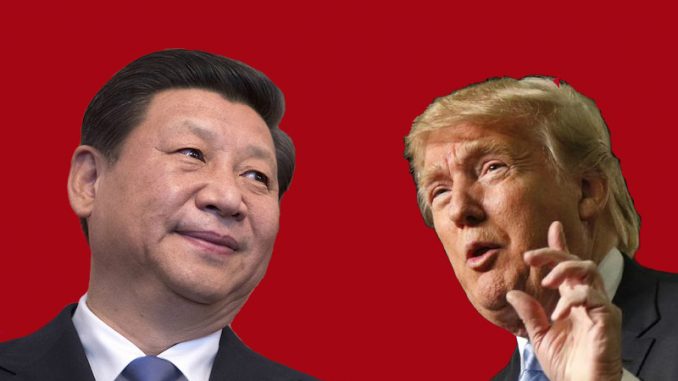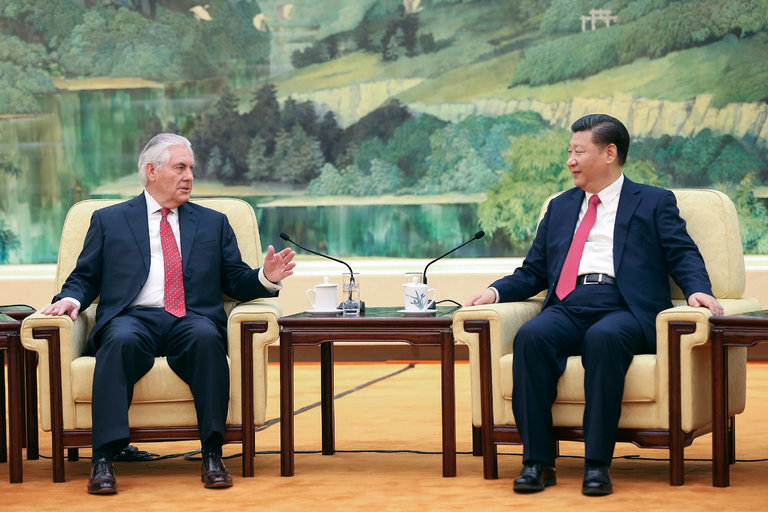
While in Seoul and Tokyo during his disastrous East Asia trip in March, empty suit “Secretary of State” Rex Tillerson made a lot of nasty and aggressive noises towards China in general and its relationship with North Korea in particular.
As soon as he got to Beijing, however, Tillerson’s bravado suddenly disappeared, and he ended up playing the courteous guest to Xi Jinping’s gracious host —
incompetently agreeing to follow the PRC phrasing on all the key issues of contention between the US and China in East Asia.
And in the time since the mess in Beijing, Tillerson’s complete lack of substance and evident inability to handle even the most minimal requirements of being Secretary of State have become conventional wisdom among DC media and policy types.
To be sure, it was an “away” game for Tillerson, and Xi’s meeting at Mar-a-Lago will take place on what is literally Trump’s home turf.
But a review of what happened in Beijing between Tillerson and Xi offers some insight into the likely dynamics of what may ensue when Trump hosts the Chinese President in steamy Palm Beach.
Tillerson and Xi made “a public display of cooperation,
sidestepping areas of disagreement even as North Korea made a defiant statement by showing off a new missile engine during the visit.
In the highest-level face-to-face meeting between the US and China since Trump took office, the two sides made no mention of other contentious issues —
including possible punitive trade measures against China and Washington’s unhappiness with Beijing’s assertiveness in the South China Sea.
Greeting the new secretary of state in an ornate room in the Great Hall of the People, Xi thanked Tillerson for a smooth transition to the Trump administration and
expressed his appreciation for the sentiment that “the China-U.S. relationship can only be defined by cooperation and friendship.”
At least in public, Tillerson adopted a far different tone than that of his boss —
who said in a Twitter post on Friday that China had “done little to help” on North Korea —
or what Tillerson himself had said about China in both Tokyo and Seoul.
Instead, Tillerson said the United States looked forward to stronger ties with China.
China has been North Korea’s biggest backer, but relations between the two countries have been strained as the North continues to pursue the development of nuclear weapons.
Hours before the meeting between Tillerson and Xi, North Korea stuck its nose under the tent,
announcing that it had tested a new high-thrust missile engine that analysts said could be used in an intercontinental missile.
The test, apparently timed for Tillerson’s visit to Beijing, was another sign North Korea was expanding its missile capabilities,
with the state news media reporting that the country’s leader, Kim Jong-un, had presided over an event of “historic significance.”
By testing the engine on Saturday, Kim appeared to be giving China an additional headache by goading Tillerson,
who said in South Korea on Friday that if the North elevated its threat, a pre-emptive strike by the US would be on the table.
The missile engine created the “perfect test” of the red line drawn by Tillerson in Seoul,
said Evans J. R. Revere, a former principal deputy assistant secretary of state specializing in North Korea.
Kim said in January North Korea was in the final stages of preparing to test an intercontinental ballistic missile, or ICBM: a weapon that could reach the US.
“Based on what just happened at the test site, he doesn’t seem to have been kidding,” Revere said.
During his 24-hour stay in Beijing, Tillerson, who also visited Japan during his first trip to Asia as secretary of state,
took the unusual step of repeating rosy Chinese language on the state of relations between the US and China.
The relationship is guided by “nonconflict, nonconfrontation, mutual respect and win-win cooperation,” Tillerson said at a news conference with Foreign Minister Wang Yi.
The Chinese state news media quoted Tillerson’s echo of the Chinese phrasing, noting it approvingly …
China strongly objects to the installation of a missile defense system in South Korea, and the polite public words from Tillerson were designed to give China “face,”
said a diplomat in Beijing who spoke on the condition of anonymity per diplomatic custom.
That meant some public warmth was necessary, the diplomat said, because aside from talking about North Korea,
Tillerson also had the task of setting a broad agenda for the summit meeting between Trump and Xi that will take place in Florida starting Thursday.
At the summit meeting, China is expected to seek a reaffirmation of the “One China” policy,
under which the US recognizes a single Chinese government in Beijing and does not maintain diplomatic ties with Taiwan.
Trump committed to that policy in a telephone conversation with Xi in early February,
but Chinese leaders, on edge about the president’s unpredictability, are eager to further secure it.
The Chinese will be looking to deter plans for tariffs and more stringent scrutiny of Chinese investment in the US.
Chinese analysts said Tillerson had probably encountered resistance to his arguments that
the missile defense system — known as Terminal High Altitude Area Defense, or THAAD — was of little danger to China,
which firmly believes that the system erodes its nuclear deterrent.
“Tillerson will repeat many times this is no threat to China, but Xi won’t believe it,”
said Shi Yinhong, a professor of international relations at Renmin University.
The best chance for cooperation on North Korea might come if China decides to more dutifully enforce some economic sanctions, Shi said.
That would be a relatively small price to pay the Americans for a smooth summit meeting in Florida,
although it would further hurt China’s already strained ties with North Korea, he said.
“Maybe Xi will broaden the punishment against North Korea somewhat, at the cost of further damaging relations with North Korea,” Shi said.
“We have punished North Korea many times, and Kim Jong-un hates China more and more.
Maybe China will take some small steps to shut down a few trading companies, but not all.”
China keeps the rudimentary North Korean economy running by supplying almost all its oil,
and there is little chance Xi would consider shutting down the pipeline,
even though China abruptly halted imports of North Korea’s coal last month, ending a valuable source of foreign currency for Pyongyang” …
Whether Xi will be able to turn Trump around in Florida as easily as he was able to Tillerson in Beijing remains to be seen.
But given the obstinate refusal of Trump and his pals to recognize that, their wishes notwithstanding, China does NOT control North Korea —
and has little reason to co-operate with a US regime that insists on blaming China for so many domestic and foreign policy problems of the US’ own making —
the chances are good Mar-a-Lago will go down in history as as big a loss for the US as
Ronald Reagan’s disastrous 1986 “just say no” meeting with Mikhail Gorbachev in Reykjavik.
Source: Rex Tillerson and Xi Jinping Meet in China and Emphasize Cooperation – The New York Times
